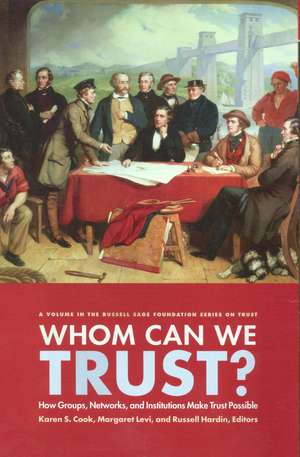Whom Can We Trust?: How Groups, Networks, and Institutions Make Trust Possible: Russell Sage Foundation Series on Trust
Editat de Karen S. Cook, Margaret Levi, Russell Hardinen Limba Engleză Hardback – 24 noi 2009
Conventional wisdom holds that trust is essential for cooperation between individuals and institutions—such as community organizations, banks, and local governments. Not necessarily so, according to editors Karen Cook, Margaret Levi, and Russell Hardin. Cooperation thrives under a variety of circum-stances. Whom Can We Trust? examines the conditions that promote or constrain trust and advances our understanding of how cooperation really works. From interpersonal and intergroup relations to large-scale organizations, Whom Can We Trust? uses empirical research to show that the need for trust and trustworthiness as prerequisites to cooperation varies widely. Part I addresses the sources of group-based trust. One chapter focuses on the assumption—versus the reality—of trust among coethnics in Uganda. Another examines the effects of social-network position on trust and trustworthiness in urban Ghana and rural Kenya. And a third demonstrates how cooperation evolves in groups where reciprocity is the social norm. Part II asks whether there is a causal relationship between institutions and feelings of trust in individuals. What does—and doesn't—promote trust between doctors and patients in a managed-care setting? How do poverty and mistrust figure into the relations between inner city residents and their local leaders? Part III reveals how institutions and networks create environments for trust and cooperation. Chapters in this section look at trust as credit-worthiness and the history of borrowing and lending in the Anglo-American commercial world; the influence of the perceived legitimacy of local courts in the Philippines on the trust relations between citizens and the government; and the key role of skepticism, not necessarily trust, in a well-developed democratic society. Whom Can We Trust? unravels the intertwined functions of trust and cooperation in diverse cultural, economic, and social settings. The book provides a bold new way of thinking about how trust develops, the real limitations of trust, and when trust may not even be necessary for forging cooperation. A Volume in the Russell Sage Foundation Series on Trust
Preț: 465.76 lei
Nou
Puncte Express: 699
Preț estimativ în valută:
89.12€ • 93.05$ • 73.76£
89.12€ • 93.05$ • 73.76£
Carte indisponibilă temporar
Doresc să fiu notificat când acest titlu va fi disponibil:
Se trimite...
Preluare comenzi: 021 569.72.76
Specificații
ISBN-13: 9780871543158
ISBN-10: 087154315X
Pagini: 360
Dimensiuni: 152 x 229 x 28 mm
Greutate: 0.68 kg
Editura: Russell Sage Foundation
Colecția Russell Sage Foundation
Seria Russell Sage Foundation Series on Trust
ISBN-10: 087154315X
Pagini: 360
Dimensiuni: 152 x 229 x 28 mm
Greutate: 0.68 kg
Editura: Russell Sage Foundation
Colecția Russell Sage Foundation
Seria Russell Sage Foundation Series on Trust
Notă biografică
KAREN S. COOK is Ray Lyman Wilbur Professor of Sociology and the current chair of the sociology department at Stanford University. MARGARET LEVI is Jere L. Bacharach Professor of International Studies in the Department of Political Science at the University of Washington, Seattle. RUSSELL HARDIN is professor of politics at New York University.












